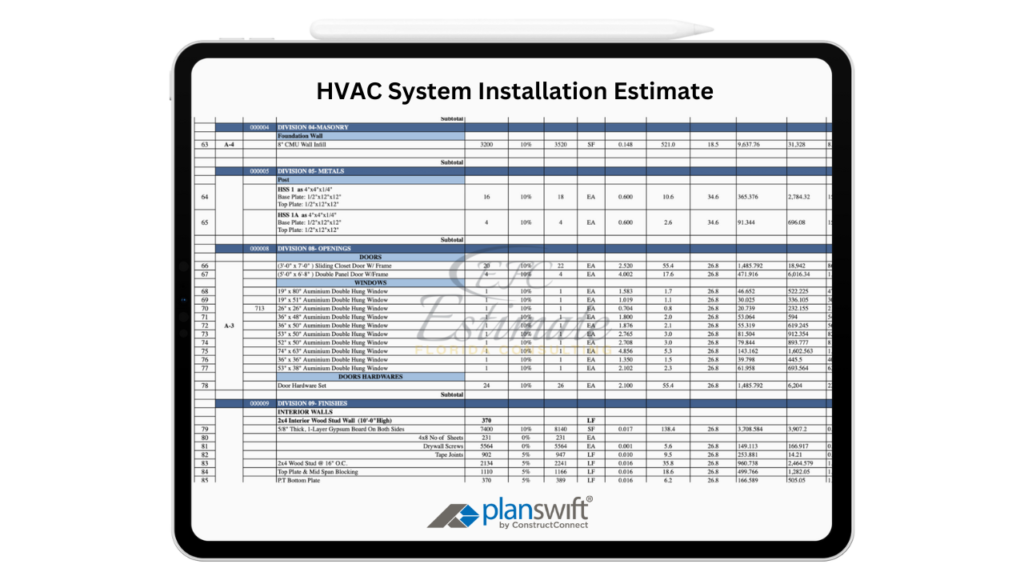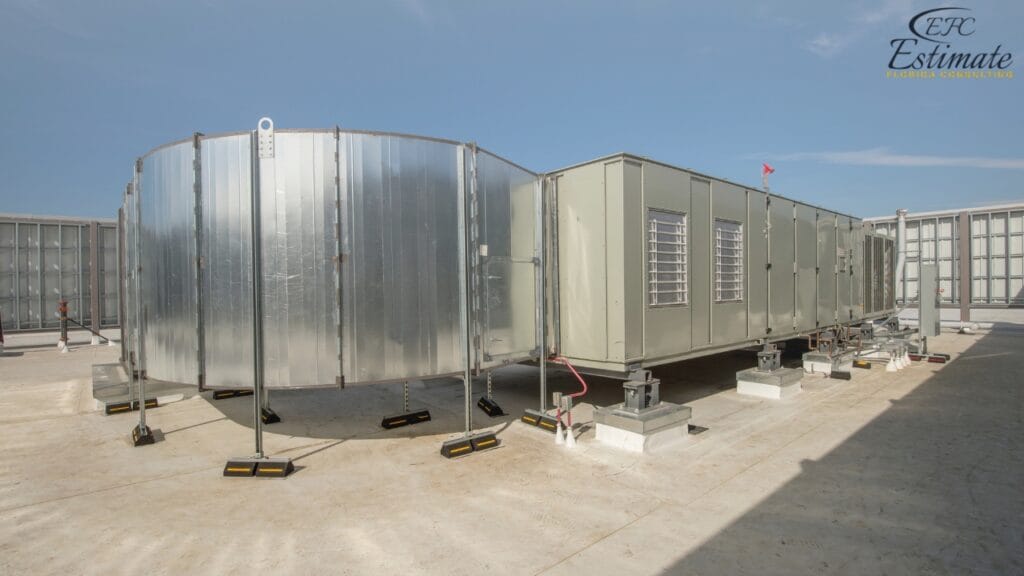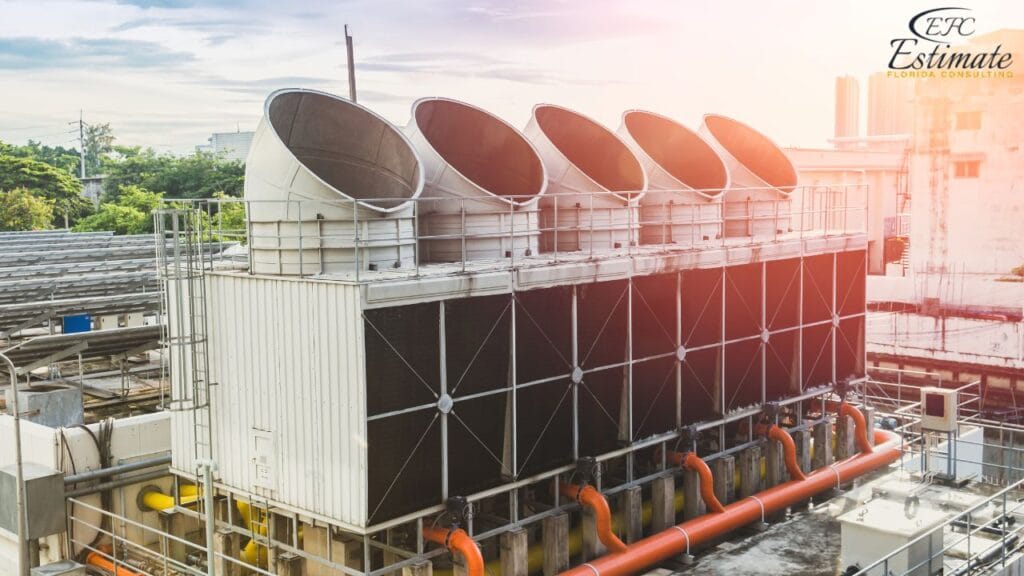90% More Chances to Win Projects With Our Estimate!
- Multi-Family Building
- Hotel Building
- Hospital Building
- Warehouse Building
- School & University Building
- High-Rise Building
- Shopping Complex
- Data Center Building

If you’re looking to maintain optimal temperatures and efficiency in your data center, investing in a new HVAC system is essential. For a data center, installing a specialized HVAC system typically costs around $110,000. Prices can vary based on the system’s complexity, with high-end installations reaching up to $165,000 and more cost-effective solutions starting at around $55,000. In this guide, we’ll break down the costs of HVAC system installation for data centers and offer insights to help you choose the best system for your needs.

The cost of installing an HVAC system in a data center can vary significantly based on several factors, including the size of the facility, the specific type of HVAC system chosen, and the complexity of the installation process. Typically, owners can expect to pay between $3.30 and $7.70 per square foot for HVAC system installation.
Here’s the cost breakdown for HVAC system installation in data center buildings presented in a table format:
Cost Category | Cost |
Average Cost | $11,000 |
Highest Cost | $16,500 |
Lowest Cost | $5,500 |
Cost Per Square Foot | $3.30 – $7.70 |
Let’s explore the specifics of HVAC system installation costs, including air conditioning and furnace prices, so you can make an informed decision tailored to your data center’s needs.
The costs associated with air conditioning systems can vary significantly based on the type of system you choose for your data center. Here’s a breakdown of the different types of air conditioning systems:
Portable air conditioners are easy to move and can cool one room at a time without requiring professional installation. They are typically the most affordable option, with prices ranging from $110 to $550 on average, depending on the brand and features.
Installing a window AC unit costs between $220 and $1,430, depending on the size and brand. These units function similarly to central air systems by drawing in outside air, cooling it, and circulating it within the room. While they’re great for cooling individual rooms or small spaces, they may not be as energy-efficient as central air systems. Additionally, they require a window for installation, which could obstruct views.
Ideal for cooling multiple rooms or larger spaces, ductless mini-split systems allow for individual temperature control in each area. They are more energy-efficient than window AC units and don’t require ductwork, although installation costs are higher. The price for a ductless mini-split system generally ranges from $2,200 to $15,400.
Central AC units are widely used in data centers, providing consistent cooling. However, installation costs can be significantly higher, ranging from $4,070 to $8,140. New ductwork, if needed, can add an additional $1,430 to $4,730 to the overall cost.
Air Conditioner Type | Average Cost |
Portable AC | $110 – $550 |
Window AC unit | $220 – $1,430 |
Ductless mini-split | $2,200 – $15,400 |
Central AC | $4,070 – $8,140 |
Furnaces are a crucial part of any heating and cooling system, providing comfortable indoor temperatures. The installation costs for furnaces can vary based on the type of fuel used:
The installation costs for electric furnaces typically range from $2,200 to $6,930. These units are cost-effective and environmentally friendly, using electrical resistance to generate heat. While they have a lower upfront cost, they can increase your monthly energy bills compared to other types.
Expect to pay between $3,850 and $9,900 for a gas furnace installation. While electric furnaces have a lower initial cost, gas furnaces are generally more energy-efficient and can save homeowners money in the long run. They also provide consistent heat output, making them ideal for colder climates.
Oil furnaces, while less common due to their higher operating costs and environmental impact, are known for their durability and fast heat generation. Installation costs for oil furnaces range from $6,600 to $11,000.
Furnace Type | Average Cost |
Electric | $2,200 – $6,930 |
Natural gas | $3,850 – $9,900 |
Oil | $6,600 – $11,000 |
Heat pumps are an excellent option for homeowners looking to efficiently heat and cool their spaces. Though installation costs may be higher than traditional furnaces, heat pumps offer energy efficiency and lower operating costs in the long run:
Ductless mini-split units, which can be installed in various rooms without ductwork, cost between $2,200 and $15,400. These units are energy-efficient and ideal for homes without existing duct systems.
A dual-fuel or hybrid unit combines a heat pump with a traditional furnace. These systems can cost between $3,300 and $16,500 but provide greater energy efficiency by switching between gas and electric heating based on outside temperatures.
Gas-fired units are popular for larger commercial buildings and can cost between $4,400 and $11,000. While they are similar to air-source heat pumps, they rely on natural gas, which can affect energy efficiency and environmental impact.
These units extract heat from outdoor air and typically range from $5,500 to $15,400. Although energy-efficient, they may struggle in extremely cold conditions.

Utilizing heat from the earth, geothermal units are extremely energy-efficient, costing between $11,000 and $38,500. They have a long lifespan and require minimal maintenance.
Heat Pump Type | Average Cost |
Ductless mini-split | $2,200 – $15,400 |
Dual fuel or hybrid | $3,300 – $16,500 |
Gas-fired | $4,400 – $11,000 |
Air-source | $5,500 – $15,400 |
Geothermal | $11,000 – $38,500 |
When planning HVAC installation for a data center, it’s essential to understand the various factors that can influence overall costs. Let’s take a closer look at these key considerations.
The type of HVAC system you select significantly impacts your installation costs. For data centers, options can range from portable AC units to more complex geothermal heat pump systems. Portable AC units, which can be easily moved around, typically start around $220, making them the most budget-friendly choice. On the higher end, geothermal heat pump systems can cost anywhere from $11,000 to $38,500.
While cheaper units may be easier on the wallet initially, they often have lower efficiency ratings and lack advanced features like zoning capabilities or smart thermostats. Conversely, more expensive units generally offer better energy efficiency, enhanced warranties, and advanced technology, which can contribute to savings on energy costs over time.
In HVAC installation, size is a crucial factor. Larger units tend to be pricier due to the increased materials and labor required for installation. However, the unit size must align with the heating and cooling demands of the data center. An undersized unit may struggle to maintain optimal temperatures, leading to equipment malfunctions or downtime. On the other hand, an oversized unit can result in inefficiencies and higher operating costs. Selecting the right size is vital for ensuring both effective performance and cost efficiency.
The Seasonal Energy Efficiency Ratio (SEER) is a critical measure of an air conditioner or heat pump’s efficiency. A higher SEER value signifies better energy efficiency, which can lead to lower utility bills over time. Although units with elevated SEER ratings often come with a higher upfront price, the long-term savings can be significant. Investing in a high-SEER unit can reduce energy consumption and enhance your data center’s operational efficiency.
The brand of your HVAC unit also plays a vital role in both upfront costs and long-term reliability. Different manufacturers vary in quality, reputation, and warranty offerings. Opting for a well-regarded brand can ensure that you receive a reliable system that performs efficiently over its lifespan. Additionally, some HVAC brands offer warranties or extended warranties, providing peace of mind and potentially saving you money on future repairs or replacements.

When planning HVAC installation for a data center, it’s essential to consider additional costs that go beyond just the unit price and labor expenses. Here are two critical factors that can significantly impact your overall installation costs:
The size of your data center is a primary consideration in determining the capacity of the HVAC unit needed for effective heating and cooling. A unit that’s too small will struggle to maintain the required temperature, potentially compromising equipment performance. Conversely, a unit that’s too large may cycle on and off frequently, wasting energy and leading to inflated utility bills. On average, you can expect to pay between $3.30 and $7.70 per square foot for HVAC systems, depending on the specific requirements and features of the installation.
If your data center already has ductwork in good condition, the installation process may be more straightforward, which can help reduce costs. However, if the existing ducts are not compatible with the new HVAC system, modifications will be necessary.
Ductwork installation typically costs between $11 and $22 per linear foot, and you’ll likely require anywhere from 50 to 200 feet of ductwork. These additional costs should be factored into your budget to ensure a seamless and efficient installation process.
The complexity of your HVAC installation project can also significantly affect costs. Various factors, such as structural considerations, required modifications, and potential obstacles, can complicate the installation process. For example, if your contractor encounters difficulties accessing specific areas of your data center or if you choose to enclose the unit with a decorative fence, your expenses may increase.
When it comes to HVAC installation, both DIY approaches and hiring a professional come with their own sets of advantages and disadvantages. If you possess experience and knowledge about HVAC systems, installing the system yourself might seem like a cost-effective option. However, it’s crucial to weigh the potential risks, such as improper installation, which can lead to system malfunctions or even safety hazards.
On the other hand, hiring a professional HVAC company guarantees that the installation is performed correctly. This not only minimizes the likelihood of future issues but also provides you with peace of mind. Professionals have the right tools and expertise to navigate any unexpected challenges that might arise during the installation process, ensuring a smoother and safer experience.

If you’re looking to save on HVAC installation costs, consider these practical tips:
Investing in a specialized HVAC system for your data center is essential for maintaining optimal performance and efficiency. While initial costs can range significantly, understanding the factors influencing pricing—such as unit type, size, and installation complexity—can help you make informed decisions. By considering energy-efficient options and preparing your space for installation, you can potentially save on both upfront and long-term costs. Ultimately, a well-chosen HVAC system will not only safeguard your critical infrastructure but also enhance the overall functionality of your data center.
The average cost of installing an HVAC system in a data center typically ranges from $110,000. Depending on the complexity and specifications, prices can vary, with high-end installations reaching up to $165,000, while more cost-effective solutions may start around $55,000.
For HVAC system installation in data center buildings, you can expect to pay between $3.30 and $7.70 per square foot. The exact price depends on several factors, including the size of the facility and the complexity of the installation process.
Several key factors affect HVAC installation costs, including:
In addition to the unit price and labor costs, consider these additional factors:
Yes, several types of HVAC systems are suitable for data centers:
At Estimate Florida Consulting, we offer detailed cost estimates across all major trades, ensuring no part of your project is overlooked. From the foundation to the finishing touches, our trade-specific estimates provide you with a complete and accurate breakdown of costs for any type of construction project.

We take pride in delivering accurate, timely, and reliable estimates that help contractors and builders win more projects. Our clients consistently praise our attention to detail, fast turnaround times, and the positive impact our estimates have on their businesses.
Estimate Florida Consulting has helped us win more bids with their fast and accurate estimates. We trust them for every project!

Submit your project plans, blueprints, or relevant documents through our online form or via email.
We’ll review your project details and send you a quote based on your scope and requirements.
Confirm the details and finalize any adjustments to ensure the estimate meets your project needs.
Receive your detailed, trade-specific estimate within 1-2 business days, ready for your project execution.

561-530-2845
info@estimatorflorida.com
Address
5245 Wiles Rd Apt 3-102 St. Pete Beach, FL 33073 United States
561-530-2845
info@estimatorflorida.com
Address
5245 Wiles Rd Apt 3-102 St. Pete Beach, FL 33073 United States
All copyright © Reserved | Designed By V Marketing Media | Disclaimer